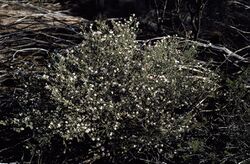Biology:Philotheca tomentella
| Philotheca tomentella | |
|---|---|

| |
| Near Baladjie Rock | |
| Scientific classification | |
| Kingdom: | Plantae |
| Clade: | Tracheophytes |
| Clade: | Angiosperms |
| Clade: | Eudicots |
| Clade: | Rosids |
| Order: | Sapindales |
| Family: | Rutaceae |
| Genus: | Philotheca |
| Species: | P. tomentella
|
| Binomial name | |
| Philotheca tomentella (Diels) Paul G.Wilson[1]
| |
| Synonyms[1] | |
| |
Philotheca tomentella is a species of flowering plant in the family Rutaceae and is endemic to the south-west of Western Australia. It is an undershrub with small club-shaped to cylindrical leaves and white flowers with a pale red central stripe, arranged singly or in groups of up to four on the ends of branchlets.
Description
Philotheca tomentella is an undershrub that typically grows to a height of 0.3–1.0 m (1 ft 0 in–3 ft 3 in) and has slightly glandular-warty branchlets. The leaves are club-shaped to more or less cylindrical, 2–3 mm (0.079–0.118 in) long, flat on the upper surface and rounded on the lower. The flowers are arranged singly or in groups of up to four on the ends of branchlets, each flower on a pedicel 1.5–3 mm (0.059–0.118 in) long. The five sepals are broadly triangular to more or less round, about 1 mm (0.039 in) long with a tiny black tip. The five petals are egg-shaped and white with a pale red central stripe and 4–5.5 mm (0.16–0.22 in) long. The ten stamens are free from each other and the anthers have a prominent white appendage. Flowering occurs from August to October and the fruit is about 3.5 mm (0.14 in) long.[2][3][4]
Taxonomy
This species was first described in 1904 by Ludwig Diels and Ernst Georg Pritzel who gave it the name Erisotemon tomentellus in Botanische Jahrbücher für Systematik, Pflanzengeschichte und Pflanzengeographie.[5][6] In 1998, Paul Wilson changed the name to Philotheca tomentella in the journal Nuytsia.[7][8]
Distribution and habitat
This philotheca grows in shrubland on sand between the Murchison Ranges, Lake Grace and Queen Victoria Spring area in the south-west of Western Australia.[3]
Conservation status
Philotheca tomentella is classified as "not threatened" by the Government of Western Australia Department of Parks and Wildlife.[2]
References
- ↑ 1.0 1.1 "Philotheca tomentella". Australian Plant Census. https://biodiversity.org.au/nsl/services/apc-format/display/162027. Retrieved 14 August 2020.
- ↑ 2.0 2.1 "Philotheca tomentella". FloraBase. Western Australian Government Department of Parks and Wildlife. https://florabase.dpaw.wa.gov.au/browse/profile/18506.
- ↑ 3.0 3.1 Wilson, Paul G.; Wilson, Annette J.G. (ed.) (2013). Flora of Australia (Volume 26). Canberra: Australian Biological Resources Study. p. 386. https://profiles.ala.org.au/opus/foa/profile/Philotheca%20tomentella. Retrieved 14 August 2020.
- ↑ Wilson, Paul G. (1970). "A taxonomic revision of the genera Crowea, Eriostemon and Phebalium (Rutaceae)". Nuytsia 1 (1): 36–37. https://www.biodiversitylibrary.org/item/223300#page/42/mode/1up. Retrieved 14 August 2020.
- ↑ "Eriostemon tomentellus". APNI. https://id.biodiversity.org.au/instance/apni/501076. Retrieved 14 August 2020.
- ↑ Diels, Ludwig; Pritzel, Ernst Georg (1904). "Fragmenta Phytographiae Australiae occidentalis. Beitrage zur Kenntnis der Pflanzen Westaustraliens, ihrer Verbreitung und ihrer Lebensverhaltnisse.". Botanische Jahrbücher für Systematik, Pflanzengeschichte und Pflanzengeographie 35 (2–3): 320–321. https://www.biodiversitylibrary.org/item/137009#page/330/mode/1up. Retrieved 14 August 2020.
- ↑ "Philotheca tomentella". APNI. https://id.biodiversity.org.au/instance/apni/557419. Retrieved 14 August 2020.
- ↑ Wilson, Paul G. (1998). "A Taxonomic Review of the genera Eriostemon and Philotheca". Nuytsia 12 (2): 256. https://www.biodiversitylibrary.org/item/226456#page/102/mode/1up. Retrieved 14 August 2020.
Wikidata ☰ Q18075485 entry
 |

